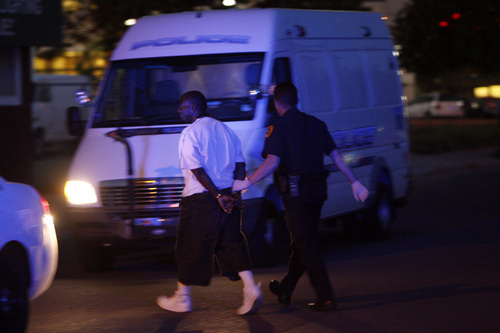This is an archived article that was published on sltrib.com in 2014, and information in the article may be outdated. It is provided only for personal research purposes and may not be reprinted.
If the tool you are carrying is a hammer, the saying goes, you tend to see every problem as a nail. If the job title you have is police chief, one might add, you are pushed to see every problem as a matter of law enforcement.
So Salt Lake City Police Chief Chris Burbank is looking at the growing storm of pathologies in the city's Rio Grande Depot district and pledging to use the main tool in his belt — allocating police officers — to deal with those problems.
But even the best, most concentrated efforts of the police will only go so far unless many other tools are also applied to the problem. Burbank's efforts will be little more than a stronger finger in a very leaky dike unless the city and other responsible parties bring more resources to bear.
Cutting down on homelessness — which means not only providing housing but also addiction treatment, mental health care and related services — is necessary, too, if anything is to get better.
Burbank is doing his job. He is responding to increasing complaints from residents, business owners and employees that the level of criminal activity, particularly drug dealing, has reached such a level as to turn an otherwise pleasant urban neighborhood into a place people fear to go.
So, as Burbank explained to the Salt Lake City Council the other day, the department will restructure the way it approaches crime in that neighborhood. He will be placing all aspects of police work, from uniformed officers on bicycles to plainclothes undercover cops, under a unified command that will focus its attention on the district that stretches from North Temple to 700 South, between Interstate 15 and State Street, and includes Pioneer Park.
The area is a magnet to many of the region's homeless people, a population that includes more than its share of both predators and prey. Which is because it also includes more than its share of people suffering from mental health issues, addictions and other side-effects that can be related either to a lifetime of handicaps or to a rapid decline resulting from a job loss, divorce or other disorienting life event.
The situation is a stark example of why a real health care overhaul, including the kind of expansion of Medicaid that was anticipated in the original Affordable Care Act, is so important.
The decision by Utah officials to resist full Medicaid expansion in favor of some more complicated scheme that favors insurance companies over people will make it that much harder for anyone — police, social workers, volunteers — to heal this neighborhood, and the too many lost souls who are to be found there.



